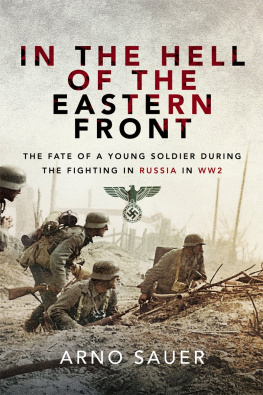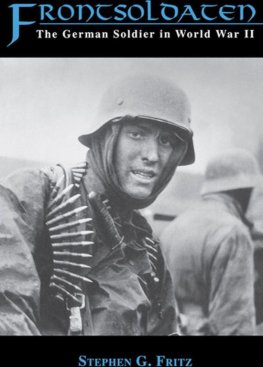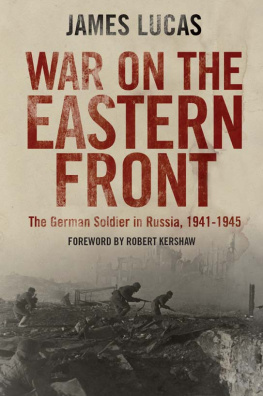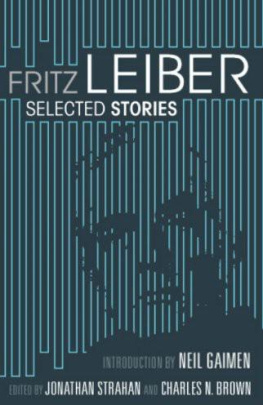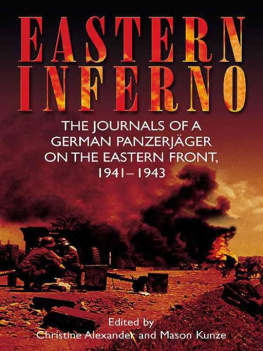Pagebreaks of the print version

In the Hell of the Eastern Front
In the Hell of the Eastern Front
The Fate of a Young Soldier During the Fighting in Russia in WW2
Arno Sauer
An imprint of
Yorkshire Philadelphia
Published in 2020 by Frontline Books,
an imprint of Pen & Sword Books Ltd,
47 Church Street, Barnsley, S. Yorkshire, S70 2AS
www.frontline-books.com
Copyright Arno Sauer 2020
The right of Arno Sauer to be identified as the author of this work has been asserted by him in accordance with the Copyright, Designs and Patents Act 1988.
ISBN: 978 1 52673 333 7
eISBN: 978 1 52673 334 4
Mobi ISBN: 978 1 52673 335 1
All rights reserved. No part of this publication may be reproduced, stored in or introduced into a retrieval system, or transmitted, in any form, or by any means (electronic, mechanical, photocopying, recording or otherwise) without the prior written permission of the publisher. Any person who does any unauthorized act in relation to this publication may be liable to criminal prosecution and civil claims for damages.
CIP data records for this title are available from the British Library
For more information on our books, please visit
or write to us at the above address.
Pen & Sword Books Ltd incorporates the imprints of Pen & Sword
Archaeology, Atlas, Aviation, Battleground, Discovery,
Family History, History, Maritime, Military, Naval, Politics,
Social History, Transport, True Crime, Claymore Press,
Frontline Books, Praetorian Press,
Seaforth Publishing and White Owl
For a complete list of Pen and Sword titles please contact
PEN & SWORD LTD
47 Church Street, Barnsley, South Yorkshire, S70 2AS, England
E-mail:
Or
PEN AND SWORD BOOKS
1950 Lawrence Rd, Havertown, PA 19083, USA
E-mail:
For Father, whose experiences continued to encourage me while writing this book.
For all future generations who have a right to the truth about the past events.
After his training with the Reich Labour Service and the Wehrmacht eighteen-year-old Fritz is sent to Army Group North at the Eastern Front. There he has to fight for survival. He sees many of his comrades die. He himself receives a life-threatening injury. Yet that is not the end of his journey
Enthralling and unsparing, this is Arno Sauers account of the true experiences of his father Fritz. Like his friends, he never wanted to be a hero and yet experienced at first hand what war really means. He and his fellow young soldiers were confronted with inconceivable suffering, and were always on the verge of death. His story is not least a powerful plea for peace.
Contents
Preface
For decades I have preserved in my memory the descriptions and accounts of the events that my father told me about his wartime experiences and youth during our countless Sunday walks in my childhood and adolescence. Often not voluntarily, upon my urging he recounted sometimes only in fragments, but also for hours in great detail depending on his need and mood experiences he lived through at that time; events and occurrences that moved, aggrieved and haunted him. Today I know that besides his ceaseless, exhausting work as master hairdresser with his own business my interest in his experiences helped him to come to terms with the bad memories and trauma of his youth.
It seems to me that it is now time for me to recount these past events, when immeasurable suffering and disaster took place. Crucial experiences like these must not be forgotten, and thus I wish to tell objectively how things were during these fateful years and how young people fared during that time.
Although innumerable publications exist on the Weimar Republic, the Third Reich and the Second World War, this authentic, objective and gritty story of a contemporary witness will reflect the life of the young generation and people in general at that time from their own perspective. Often, with the passage of time, this period of history has been distorted both positively and negatively; glorified and manipulated towards both ends. Therefore I wish to commit to historical memory and preservation the experiences of a boy from the Vordereifel, who is representative of a whole generation in the German Reich at that time.
Childhood, youth, apprenticeship, labour service, deployment as a soldier in a doomed, cruel war a fate experienced in a similar manner by thousands of people are all described in this biographical account.
It was a youth shaped in its foundations by its idealism and commitment, its enthusiasm, innovations, gullibility and morals, its decency and respect.
This was a generation that had to experience, suffer and bear a different kind of youth. Faced with growing up in a world that was crueller, harder and more desperate, bleaker and more disappointing, and full of hardship, they became more capable of suffering than many following generations. They were a gullible young generation cheated of their youth, betrayed and abused. They nonetheless never lost their courage or their faith in the good and in a better, more peaceful life.
No other country on earth had been so trodden to the ground in its total destruction after a long war more terrible and brutal than any previous war. The dire fact was that this calamitous conflict had emanated from German soil and after almost six years it ended there in absolute downfall.
A new beginning seemed more hopeless than ever, more difficult than in any other country afflicted by war. Thousands of cities, towns, villages, industrial installations, roads, bridges, churches, schools and hospitals had been destroyed. Five million soldiers had fallen or been reported missing, around 600,000 women, children and old people had fallen victim to uncounted bombing raids, up to two million people lost their lives while fleeing. More than 13 million people were driven from their former homeland in the German eastern territories.
The majority of these people did not give up and did not leave Germany. This also holds true for the poor expelled people and families from East and West Prussia, Pomerania, Silesia, Bohemia, Moravia and other Germanspeaking regions, who settled in the centre and west of Germany. They all stayed to rebuild Germany and to look forward in order to lead their country to a fair and better future, in spite of the inexpressibly severe and lasting suffering of many parties concerned.
This book shall contribute to the realisation that war does not only mean the worst for the people afflicted, but that such terrible, tragic events with all their consequences must be prevented before they reach that stage.It has been my intention to reflect the time then as it really was, without whitewashing or condemning, without glorifying or judging. All descriptions, even in their details, correspond to facts. Personal names have for the most part been kept in their original form except for the few that have been forgotten. Where required, in individual cases names have been changed to avoid distress for the relatives concerned.

